Galileo Galilei
1564–1642 |
Galileo Galilei was an Italian scientist and mathematician who played a crucial role in the Scientific Revolution of seventeenth century Europe. He supported the Copernican model of a heliocentric universe—a solar system in which the planets revolved around the Sun, not the Earth—and as a result he faced much persecution from his contemporaries as well as the Catholic Church. Still, he persevered in his studies and discoveries, and he is credited as responsible for the birth of modern science.
Born in Pisa, Italy, Galileo at one point considered joining the priesthood, but he decided instead to attend the local university. Rather than complete a medical degree at his father’s urging, however, he chose to study mathematics, and after his graduation he ascended to the position of chief mathematician of Pisa. He later returned to his college, where he taught geometry, mechanics, and astronomy until 1610. During this time, he made breakthroughs in theoretical as well as applied science, and in 1610 he published an account of his astronomical findings, many of which he believed would prove the theory of a sun-centered universe. He visited Rome to demonstrate his telescope to the intellectuals present, and to let them observe the planets and moons of which he had spoken in his report. Unfortunately, only a few years later, Galileo’s discoveries were denounced as heresy, and despite his attempts to plead his case, he was ordered to refrain from teaching Copernican astronomy. The mathematician immediately returned home and set to work on two scientific works, the second of which would again arouse trouble.
Shortly after the publication of Dialogue Concerning the Two Chief World Systems, in which he praised the Copernican universe, Galileo was ordered to appear in Rome for a papal trial. He was placed under house arrest, a sentence that would remain in place until his death. From 1634 onward, he stayed in his home near Florence, reading the seven penitential psalms every day until his daughter took that burden upon herself. Four years later, he went completely blind and was allowed to travel to Florence to seek medical advice. He continued to speak and receive visitors until his death from heart complications in 1642.
Key events during the life of Galileo:
| Born | |
| Appointed to the chair of mathematics in Pisa | |
| Taught mathematics and science at the University of Pisa | |
| Published an account of his telescopic observations of Jupiter | |
| Galileo's heliocentric theories were denounced by the Church | |
| Published his first book, The Assayer | |
| Published his second book, Dialogue Concerning the Two Chief World Systems | |
| Ordered to appear before the Holy Office in Rome | |
| Placed under house arrest until his death | |
| Went completely blind | |
| Died |
Other Resources
| Galileo and the Lamps in | Thirty More Famous Stories Retold by James Baldwin |
| Galileo Galilei in | Stories of the Great Scientists by Charles R. Gibson |
| Appendix I: Letter of Galileo in | Stories of the Great Scientists by Charles R. Gibson |
| Galileo in | Famous Men of Modern Times by John H. Haaren |
| New Astronomy in | The Story of Europe by Henrietta Elizabeth Marshall |
| Galileo in | Story Lives of Great Scientists by F. J. Rowbotham |
| Galileo and the Wonders of the Telescope in | Children's Stories of the Great Scientists by Henrietta Christian Wright |
Image Links | ||
|---|---|---|
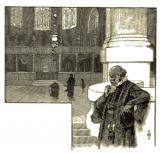 Galileo and the Lamps in Thirty More Famous Stories Retold |
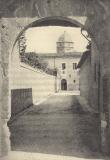 The Home of Galileo Galilei in Stories of the Great Scientists |
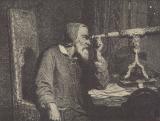 Galileo and his telescope in Famous Men of Modern Times |
 Galileo showing the heavenly bodies through his telescope in Famous Men of Modern Times |
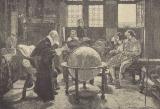 Milton visiting Galileo at Florence in Famous Men of Modern Times |
Galileo-Galilei in Back Matter |
Galileo before the Inquisition in Back Matter |
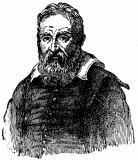 Galileo in Story Lives of Great Scientists |
 Birthplace of Galileo, Pisa in Story Lives of Great Scientists |
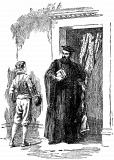 He begged Ricci to teach him more in Story Lives of Great Scientists |
 Demostrating his theory of the speed of falling bodies in Story Lives of Great Scientists |
 The doors were closed behind him in Story Lives of Great Scientists |
 Galileo Galileo in Children's Stories of the Great Scientists |
||
| Tycho Brahe | Made accurate astronomical observations, used by Kepler to calculate motion of planets. |
| Johannes Kepler | Proposed Heliocentric theory after studying measurements of Tycho Brahe. |